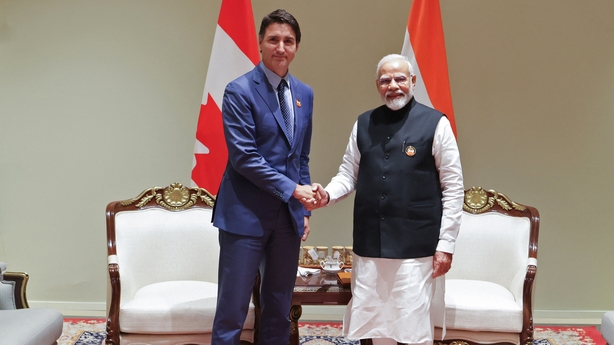Canadian Prime Minister Justin Trudeau said Canada was "actively pursuing credible allegations" linking Indian government agents to the murder of a Sikh separatist leader, Hardeep Singh Nijjar, in British Columbia in June.
Canada is home to an influential Sikh community and Indian leaders say there are some fringe groups there that are still sympathetic to the cause of an independent Sikh state called Khalistan, carved out of India.
A Sikh insurgency that was suppressed in India in the 1990s killed some 30,000 people, while Sikh militants were blamed for the 1985 bombing of an Air India Boeing 747 flying from Canada to India.
All 329 people on board were killed as the plane came down off the coast of Ireland.
Here is what is known about the probe into the Canadian citizen's murder:
On the evening of 18 June, Canada's Royal Canadian Mounted Police (RCMP) received a report of a shooting at the Guru Nanak Sikh Gurdwara, a Sikh place of worship, in the city of Surrey in the British Columbia province.
First responders located a man, later identified as 45-year old Hardeep Singh Nijjar, suffering from multiple gunshot wounds inside a vehicle. Mr Nijjar died from his injuries at the scene, RCMP said.
The Integrated Homicide Investigation Team (IHIT) took conduct of the investigation.
Investigators said that two suspects, described as "heavier set males, wearing face coverings", fled the scene on foot and likely had a vehicle waiting for them close by from the murder scene. Authorities later said there was a third suspect as well. No arrests have been made.
In July, investigators released information to the public of the believed route taken by the two suspects after the murder. Authorities later identified the vehicle which was waiting for the suspects as a silver 2008 Toyota Camry.
There were suspicions raised by local community members that there may have been foreign interference in the murder of the Sikh separatist leader.
"We understand there is a lot of speculation regarding the motive of this homicide, but we are dedicated to learning the facts and letting the evidence lead our investigation," Timothy Pierotti, an official with IHIT, said in the early stages of the inquiry.
Mr Trudeau said yesterday Canada had credible information linking Indian government agents to the murder.
He did not directly accuse India of definitely being involved and Foreign Minister Melanie Joly later used more cautious language, saying "if proven true" the allegations would be unacceptable.
Mr Trudeau's comments marked the latest strain in relations between Ottawa and New Delhi this year.
Canada has the highest population of Sikhs outside their home state of Punjab in India, and the country has been the site of many protests that have irked India.
Earlier this month, Canadian Trade Minister Mary Ng postponed a trade mission to India planned for October.
Both countries said they paused trade talks after expressing earlier in 2023 they aimed to seal an initial trade deal this year.
Bilateral commercial relations between the two countries are worth $100bn, which includes $70bn of Canadian portfolio investment, according to Indian figures.

Indian Prime Minister Narendra Modi conveyed strong concerns about protests in Canada against India to Mr Trudeau on the sidelines of the G20 summit in New Delhi.
While a Sikh insurgency was suppressed in India in the 1990s, authorities have been wary of any revival of agitation, with a particular focus on small groups of Sikhs in Canada, who support the separatist demand and occasionally stage protests outside Indian embassies.
In June, India's foreign minister S Jaishankar hit out at Canada for allowing a float in a parade depicting the 1984 assassination of then-Indian prime minister Indira Gandhi by her bodyguards, perceived to be glorification of violence by Sikh separatists.
Ms Gandhi was assassinated in 1984 by two Sikh bodyguards after she allowed the storming of the holiest Sikh temple, aimed at flushing out Sikh separatists who demanded an independent homeland to be known as Khalistan.
The storming of the temple had angered Sikhs around the world.
In March, India summoned Canada's High Commissioner to convey concern over pro-Khalistan protesters in Canada who breached the security of India's diplomatic mission and consulates.

